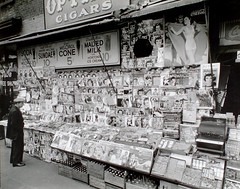What does it mean to be in the public domain? Thoughts about the AP licensing scheme.
By Kristopher A. Nelson
in
August 2009
600 words / 3 min.
Tweet
Share
The AP has begin trying to license content through a payment scheme. Some of the content – as recently demonstrated by James Grimmelmann “purchasing” a Thomas Jefferson quote – is in the public domain. Does the AP have the right to sell/license this public-domain content? What does it mean to be in the public domain?
Please note that this post is from 2009. Evaluate with care and in light of later events.
 The AP has begin trying to license content through a payment scheme. Some of the content — as recently demonstrated by James Grimmelmann “purchasing” a Thomas Jefferson quote — is in the public domain. Does the AP have the right to sell/license this public-domain content? What does it mean to be in the public domain?
The AP has begin trying to license content through a payment scheme. Some of the content — as recently demonstrated by James Grimmelmann “purchasing” a Thomas Jefferson quote — is in the public domain. Does the AP have the right to sell/license this public-domain content? What does it mean to be in the public domain?
Randy Picker responds by saying:
We should review how the public domain works. The public domain is sold every day. Every time you buy a copy of Hamlet you are paying for a public domain work. I do H.G. Wells’s The War of the Worlds in my copyright class on this starting with Project Gutenberg — free, of course — and then heading to Barnes & Noble and Amazon, where the prices range from $2.50 to $13.95 see slides 3 to 13. That is precisely the nature of the public domain: anyone can use it for whatever they want, including selling it. The AP is fully within its rights to sell public domain content just as Amazon does every day.
via The University of Chicago Law School Faculty Blog: The Associated Press: Selling the Public Domain?
To restate: there is absolutely nothing legally wrong with the AP licensing or selling public-domain content. To paraphrase concepts from the open source world, public-domain content is free (as in speech, “libre”) not free as in beer.
As Picker puts it, “Public domain content is outside the copyright system. Again that is its nature.”
You have no right to access of public-domain materials (perhaps unfortunately). You have no right to get them without paying. Instead, such materials are free for anyone to use in any way they wish. The AP can sell the material. You can sell the content. Anyone can do with it what they wish.
(A side note: a license by the AP to such content may be invalid, in the sense that once you have it, you can do with it as you wish — although potentially you may still breach a contract you have with the licensor. Picker, for example, writes, “Ordinary rules regarding contracts and licenses should apply to circumstances under which someone is given access to public domain content.” I can envision counterarguments. In other words: it’s complicated. Thus the existence of lawyers.)
Bizarre? Unfair? Strange? Perhaps. But consider that the protections of copyright are a modern addition to the world. Pre-18th century (to grossly simplify things), if you sold your manuscript, you sold the “copyright” as well. All intellectual creations were, in a sense, in the public domain (although the concept didn’t quite exist — without modern copyright, there is no concept of “public domain” either — there is simply one state, not too).
Modern copyright changed this, and arguably encouraged creation — but it also locks up works in various ways as well. Thus the need for a balance, I believe, between the protections of intellectual property (which is not quite like ordinary property, which is why you only “infringe” IP) and the dizzying freedoms of the public domain.
Related articles by Zemanta
- Associated Press will sell you a license to quote the public domain (boingboing.net)
- AP Will Sell You A License To Words It Has No Right To Sell (techdirt.com)
